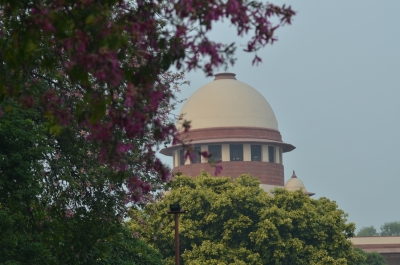SC on Shaheen Bagh: Dissent against colonisers can't be equated with dissent in democracy
By IANS | Published: October 7, 2020 06:30 PM2020-10-07T18:30:09+5:302020-10-07T18:45:16+5:30
New Delhi, Oct 7 The Supreme Court on Wednesday said it cannot accept that an indeterminable number of ...

SC on Shaheen Bagh: Dissent against colonisers can't be equated with dissent in democracy
New Delhi, Oct 7 The Supreme Court on Wednesday said it cannot accept that an indeterminable number of people can assemble whenever they choose to protest, and cited the distinction between the manner of dissent against colonial rule and the expression of dissent in a democratic system.
A bench comprising Justices Sanjay Kishan Kaul, Aniruddha Bose and Krishna Murari said India traces its foundation back to when the seeds of protest during our freedom struggle were sown deep, to eventually flower into a democracy. "What must be kept in mind, however, is that the erstwhile mode and manner of dissent against colonial rule cannot be equated with dissent in a self-ruled democracy," said the top court.
The bench observed that the country's constitutional scheme comes with the right to protest and express dissent, but with an obligation towards certain duties, as Article 19, one of the cornerstones of the Constitution, confers upon citizens two treasured rights, i.e., the right to freedom of speech and expression under Article 19(1)(a) and the right to assemble peacefully without arms under Article 19(1)(b).
"These rights, in cohesion, enable every citizen to assemble peacefully and protest against the actions or inactions of the State. The same must be respected and encouraged by the State, for the strength of a democracy such as ours lies in the same", added the top court.
The bench said it cannot accept an indeterminable number of people who can assemble whenever they choose to protest. The bench also cited Pulitzer Prize winner American political commentator Walter Lippmann, who said "In a democracy, the opposition is not only tolerated as constitutional, but must be maintained because it is indispensable.a
Emphasising that protesters cannot block public roads and cause grave inconvenience to commuters, the bench said: "we have to make it unequivocally clear that public ways and public spaces cannot be occupied in such a manner and that too indefinitely. Democracy and dissent go hand in hand, but then the demonstrations expressing dissent have to be in designated places alone."
Citing lack of action of authorities concerned, the bench said the courts adjudicate the legality of the actions and are not meant to give shoulder to the administration to fire their guns from. "Unfortunately, despite a lapse of a considerable period of time, there was neither any negotiations nor any action by the administration, thus warranting our intervention", said the bench.
The verdict came on the petition filed by advocate Amit Sahni that the persons opposing the Citizenship Amendment Act and the National Register of Citizens, had adopted a method of protest which resulted in the closure of the Kalindi Kunj Shaheen Bagh stretch, including the Okhla underpass from December 15, 2019. The petitioners sought direction to be issued to clear public roads.
( With inputs from IANS )
Disclaimer: This post has been auto-published from an agency feed without any modifications to the text and has not been reviewed by an editor
Open in app